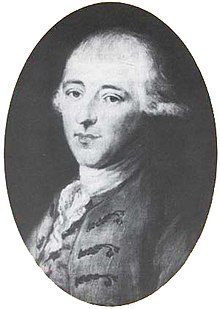Pierce Butler
| Pierce Butler | |
|---|---|
 |
|
|
United States Senator from South Carolina |
|
|
In office March 4, 1789 – October 25, 1796 |
|
| Preceded by | Inaugural holder |
| Succeeded by | John Hunter |
|
In office November 4, 1802 – November 21, 1804 |
|
| Preceded by | John E. Colhoun |
| Succeeded by | John Gaillard |
| Delegate from South Carolina to the Congress of the Confederation | |
|
In office May 25, 1787 – September 17, 1787 |
|
| Personal details | |
| Born |
July 11, 1744 County Carlow, Ireland |
| Died | February 15, 1822 (aged 77) Philadelphia, Pennsylvania |
| Resting place | Christ Episcopal Church and Churchyard, Philadelphia |
| Political party | Federalist, Democratic-Republican |
| Profession | soldier, planter |
| Religion | Episcopalian |
| Military service | |
| Allegiance | |
| Service/branch |
|
| Years of service | 1779–1782 |
| Rank |
Adjutant General Major (combat rank) |
| Battles/wars | |
![]() Kingdom of Great Britain
Kingdom of Great Britain![]() United States of America
United States of America
Pierce Butler (July 11, 1744 – February 15, 1822) is recognized as one of United States' Founding Fathers and was a soldier, planter, and statesman. He represented South Carolina in the Continental Congress, the 1787 Constitutional Convention, and the U.S. Senate.
One of the largest slaveholders in the United States, Butler defended American slavery for both political and personal motives even though he had private misgivings about the institution, and particularly about the African slave trade. He introduced the Fugitive Slave Clause of the U.S. Constitution during the convention and supported other measures to benefit slaveholders, including counting the full slave population in state totals for the purposes of Congressional apportionment. The compromise measure provided for counting three-fifths of the slave population in state totals, which led to Southern states having disproportionate power.
...
Wikipedia
